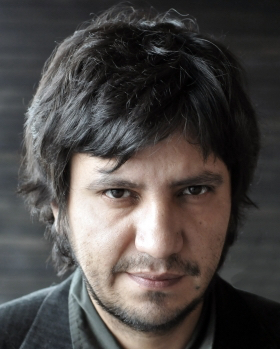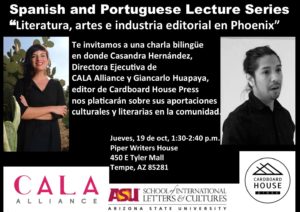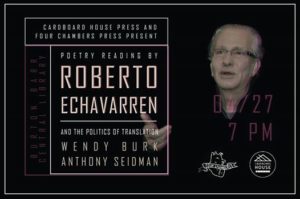 Alejandro Zambra will be in residency the first week of October – Cardboard House Press, CALA Alliance, and Palabras Bilingual Bookstore is hosting three free events with Zambra throughout the week. These events include a bilingual workshop, a visit to ASU, and a talk at Changing Hands in Phoenix.
Alejandro Zambra will be in residency the first week of October – Cardboard House Press, CALA Alliance, and Palabras Bilingual Bookstore is hosting three free events with Zambra throughout the week. These events include a bilingual workshop, a visit to ASU, and a talk at Changing Hands in Phoenix.
The New York Times Book Review named Zambra “the most talked-about writer to come out of Chile since Bolaño.” He has published poetry and five novels: Multiple Choice, Bonsai, The Private Lives of Trees, Ways of Going Home and My Documents. His stories have appeared in many publications, including The New Yorker, The Paris Review, Harper’s, Tin House, and McSweeney’s. He was also named one of Granta’s Best Young Spanish-Language Novelists in 2010. Born in Chile in 1975, Zambra’s fiction often explores how a society is haunted by legacies of the past. He often toys with originality and humor – his new book, Multiple Choice, is even written in the structure of Chile’s Academic Aptitude Test, the standardized college admissions test in Chile until 2003. In it, he explores how education and testing restricted art and ideas during the dictatorship.
The first event is a bilingual workshop titled “How To Forget How to Write Fiction.” The 12 workshop participants will “explore and break conventions of fiction writing based on a text about their first memories.” The workshop will be conducted in both English and Spanish, and it will take place October 3-6. Unfortunately, the deadline to apply for the workshop has already passed. However, if you missed the opportunity to apply, you can still attend the other two events!
The second event is a visit to ASU, in which Zambra will discuss his works and fiction. It will take place on Thursday, October 5 from 12:00pm to 1:15pm on the ASU Tempe campus in COOR 184. For more information, check out the Facebook page.
The third event is a bilingual talk and reading at the Phoenix Changing Hands Bookstore (300 W Camelback Rd, Phoenix, Arizona 85013). It will also take place on Thursday, October 5 from 7:00pm to 9:00pm. For more information, check out the Facebook page.
 Meet Your Literary Community
Meet Your Literary Community
 Alejandro Zambra will be in residency the first week of October –
Alejandro Zambra will be in residency the first week of October – 